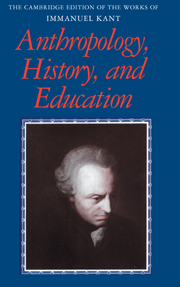Book contents
- Frontmatter
- Contents
- General editors' preface
- Preface
- General introduction
- 1 Observations on the feeling of the beautiful and sublime (1764)
- 2 Essay on the maladies of the head (1764)
- 3 Review of Moscati's work Of the corporeal essential differences between the structure of animals and humans (1771)
- 4 Of the different races of human beings (1775)
- 5 Essays regarding the Philanthropinum (1776/1777)
- 6 A note to physicians (1782)
- 7 Idea for a universal history with a cosmopolitan aim (1784)
- 8 Review of J. G. Herder's Ideas for the philosophy of the history of humanity. Parts 1 and 2 (1785)
- 9 Determination of the concept of a human race (1785)
- 10 Conjectural beginning of human history (1786)
- 11 Some remarks on Ludwig Heinrich Jakob's Examination of Mendelssohn's Morning hours (1786)
- 12 On the philosophers' medicine of the body (1786)
- 13 On the use of teleological principles in philosophy (1788)
- 14 From Soemmerring's On the organ of the soul (1796)
- 15 Anthropology from a pragmatic point of view (1798)
- 16 Postscript to Christian Gottlieb Mielcke's Lithuanian–German and German–Lithuanian dictionary (1800)
- 17 Lectures on pedagogy (1803)
- Editorial notes
- Glossary
- Bibliography
- Index
Preface
Published online by Cambridge University Press: 05 May 2013
- Frontmatter
- Contents
- General editors' preface
- Preface
- General introduction
- 1 Observations on the feeling of the beautiful and sublime (1764)
- 2 Essay on the maladies of the head (1764)
- 3 Review of Moscati's work Of the corporeal essential differences between the structure of animals and humans (1771)
- 4 Of the different races of human beings (1775)
- 5 Essays regarding the Philanthropinum (1776/1777)
- 6 A note to physicians (1782)
- 7 Idea for a universal history with a cosmopolitan aim (1784)
- 8 Review of J. G. Herder's Ideas for the philosophy of the history of humanity. Parts 1 and 2 (1785)
- 9 Determination of the concept of a human race (1785)
- 10 Conjectural beginning of human history (1786)
- 11 Some remarks on Ludwig Heinrich Jakob's Examination of Mendelssohn's Morning hours (1786)
- 12 On the philosophers' medicine of the body (1786)
- 13 On the use of teleological principles in philosophy (1788)
- 14 From Soemmerring's On the organ of the soul (1796)
- 15 Anthropology from a pragmatic point of view (1798)
- 16 Postscript to Christian Gottlieb Mielcke's Lithuanian–German and German–Lithuanian dictionary (1800)
- 17 Lectures on pedagogy (1803)
- Editorial notes
- Glossary
- Bibliography
- Index
Summary
The present volume in the Cambridge Edition of the Works of Immanuel Kant in Translation contains seventeen works by Kant published over a thirty-nine-year period, including Kant's most popular early work, Observations on the Feeling of the Beautiful and Sublime (1764), the last work Kant himself saw to publication, Postscript to Christian Gottlieb Mielcke's Lithuanian–German and German–Lithuanian Dictionary (1800), and the last work edited on Kant's behalf during his lifetime, Lectures on Pedagogy (1803). The volume contains all of Kant's published works in cultural and physical anthropology, in the philosophy of history and in the philosophy of education. The works vary in character and length from short reviews of the works of others and postscripts to the works of others through extensive essays published in leading journals of the time to book-length studies that codify Kant's considered views in a larger area of philosophy.
The philosophical center of the present volume is occupied by Kant's two works in the philosophy of history, Idea for a Universal History with a Cosmopolitan Aim (1784) and Conjectural Beginning of Human History (1786), and by Kant's book publication of his lectures on anthropology, Anthropology from a Pragmatic Point of View (1798). This core is supplemented by Kant's three sequentially conceived contributions to the contemporary debate about the unity of the human species and its division into races, Of the Different Races of Human Beings (1775), Determination of the Concept of a Human Race (1785), and On the Use of Teleological Principles in Philosophy (1788); by a number of smaller works on physical and cultural specifics of the human being, and by Kant's two work groups in the philosophy of education, Essays Regarding the Philanthropinum (1776/7) and Lectures on Pedagogy.
- Type
- Chapter
- Information
- Anthropology, History, and Education , pp. xiii - xviPublisher: Cambridge University PressPrint publication year: 2007

